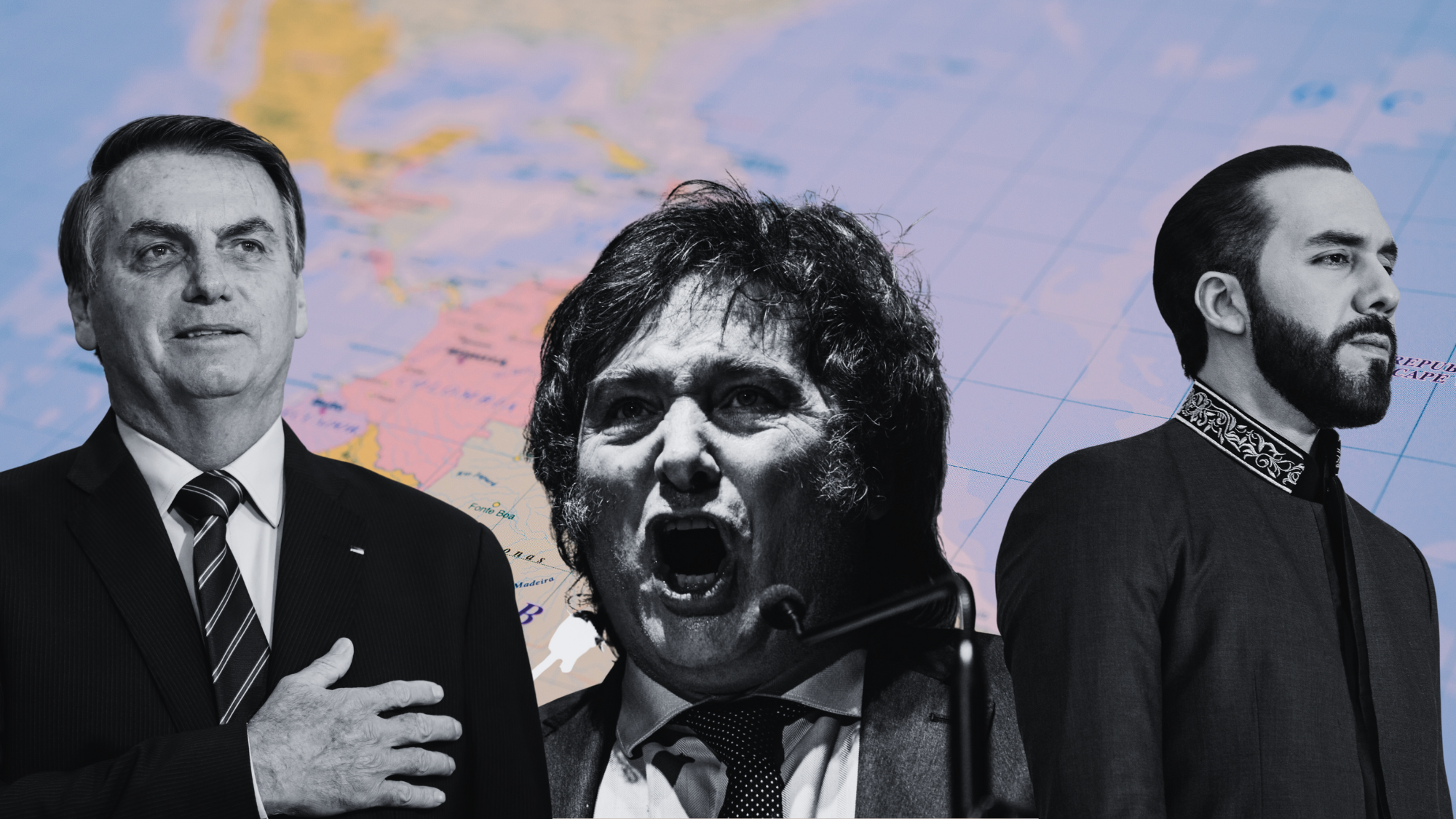The “Coolest Dictator” and El Loco: The New Latin American Right
Across Latin America, leaders have adopted increasingly bold platforms to propel them into office. Argentinian President Javier Milei campaigned on vows of a much-needed libertarian blow to the system, vowing to replace the peso with the U.S. dollar, shutter the central bank, and dramatically cut government spending, which he symbolized by waving chainsaws at rallies. El Salvador’s Nayib Bukele’s popularity skyrocketed after his campaign pledges to clamp down on rampant organized crime groups, which translated to mass incarcerations once in office. For the constituents of these leaders, their arrivals heralded long-awaited and long-anticipated change, bucking long-standing political trends of bureaucracy, corruption, or greed.
What has made this current brand of Latin American populism popular among voters was an opportune combination of fatigue with the current political status quo and bombastic politicians sporting enthusiastic personalities and ambitious ideas. Some of these new ideas have worked—at a cost. For example, on April 5, 2024, Ecuadorian police stormed the Mexican embassy in Quito—a blatant violation of international sovereignty – to arrest former Ecuadorian Vice President Jorge Glas. The brazenness with which Ecuador moved to arrest Glas stunned governments worldwide. However, the move was enormously popular for Ecuadorian President Daniel Noboa among his constituents. The embassy raid is just one of the bold and highly publicized political decisions made by a steadily resurgent Latin American right that aims to prioritize pleasing its voter base to consolidate power, even at the expense of democratic norms. Latin America’s new right-wing leaders have promised to deliver needed policy overhauls and reforms but have paved the way for democratic backsliding as populations trade democratic freedoms and liberties for greater security or economic stability.
The ‘Coolest’ Autocrat
Nayib Bukele strikes a unique figure among the heads of state in Latin America—young, social media savvy, and irreverent in his beliefs. Jokingly calling himself “The World’s Coolest Dictator” on social media, Bukele has quickly become one of El Salvador’s most popular leaders due to the astonishing crackdown on crime. Once plagued by enormous criminal organizations like MS-13, El Salvador clamped down on its gangs in a manner never before seen in the country. Since Bukele took office in 2019, intentional homicide rates have decreased from 38 per 100,000 in that year to 7.8 in 2022, well below the Latin American average of 16.4 for the same year.
Bukele is so immensely popular that his re-election for a controversial third term was a landslide; this came after a government mandate passed, which allowed him to run for more than two terms. Doing so has not only validated his policies in El Salvador but set a dangerous precedent whereby his indisputable popularity could easily propel him to a fourth term and beyond. Similarly, while the crackdown on crime has certainly reaped benefits for El Salvador and its people, it goes hand in hand with numerous allegations of human rights abuse and thousands upon thousands of detainees incarcerated in Salvadoran prisons while they indefinitely await a trial. While Salvadorans relish a country with unprecedented levels of reduced crime, they are increasingly finding a scenario whereby their newfound safety and security may come at the cost of democratic backsliding and eroding freedoms. It is a pattern gaining a concerning level of traction, especially further to the south, in Argentina.
El Loco
Brandishing a chainsaw while screaming “Viva Libertad carajo!” (“Long live freedom dammit!”) may not seem like the typical pathway to the Argentinian presidency, but Javier Milei is no typical politician. A self-described “anarcho-capitalist” dubbed El Loco who filmed dramatic videos demonstrating how he would cut down on profligate government spending, Milei’s firebrand personality and a national desire for change propelled him to a stunning victory against his Peronist opponent. Though some of his more extreme libertarian proposals were quietly pared back to facilitate the passing of legislation with Parliament members, Milei has doggedly pursued campaign promises that put him directly at odds with Argentina’s political class. This political clash is leading to concerns that Milei maintains a “disdain for democratic institutions,” a claim bolstered by reports of his continual attacks on the Argentine press and encouraging Argentine politicians to boycott interviews. Critics believe these attacks may lay the groundwork for a wider deterioration of the country’s democratic institutions.
In many ways, spurred by the success of prior right-wing presidents, this newer generation of right-leaning Latin American leaders poses a unique conundrum for both Latin American countries and the world. As ambitious leaders charm their way into office, promising and sometimes delivering badly-needed reforms to their countries, trends point to a greater likelihood that these nations may begin to experience democratic backsliding and eroding of liberties. If a region as large, diverse, and economically critical as Latin America experiences a decline in political freedoms in exchange for a greater perception or sensation of safety or economic prosperity, it stands to reason that other leaders will begin to pay greater attention to their peers and take notes. As democracies worldwide face a growing number of threats, domestic and foreign, ensuring that Latin American governments maintain the democratic rule of law remains more critical than ever.
Views expressed are the author’s own and do not represent the views of GSSR, Georgetown University, or any other entity. Image Credit: Wikimedia Commons, NPLA, Wikimedia Commons, edited with Canva Images
